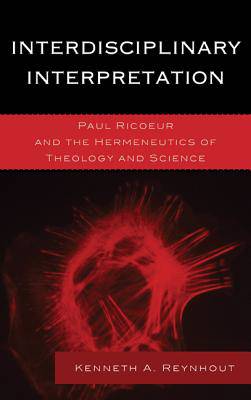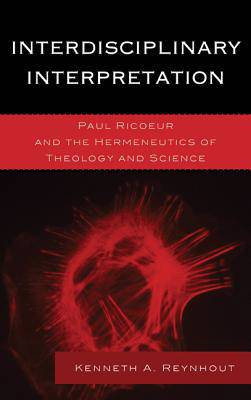
- Afhalen na 1 uur in een winkel met voorraad
- Gratis thuislevering in België vanaf € 30
- Ruim aanbod met 7 miljoen producten
- Afhalen na 1 uur in een winkel met voorraad
- Gratis thuislevering in België vanaf € 30
- Ruim aanbod met 7 miljoen producten
Zoeken
Interdisciplinary Interpretation
Paul Ricoeur and the Hermeneutics of Theology and Science
Kenneth A Reynhout
€ 193,45
+ 386 punten
Uitvoering
Omschrijving
The past fifty years has seen the emergence of an energetic dialogue between religion and the natural sciences that has contributed to a growing desire for interdisciplinarity among many constructive theologians. However, some have also resisted this trend, in part because it seems that the price one must pay for such engagement is much too high. Interdisciplinary work appears overly abstract and methodologically restrictive, with little room for systematic theologians self-consciously operating within a particular historical tradition. In Interdisciplinary Interpretation: Paul Ricoeur and the Hermeneutics of Theology and Science, Kenneth A. Reynhout seeks to address this concern by constructing an alternative understanding of interdisciplinary theology based on the hermeneutical thought of Paul Ricoeur, generally recognized as one of the most interdisciplinary philosophers of the twentieth century. Appealing to Ricoeur's view of interpretation as the dialectical process of understanding through explanation, Reynhout argues that theology's engagement with the natural sciences is fundamentally hermeneutical in character. As such, interdisciplinary theologians can faithfully borrow meaning from the sciences through a process of "interdisciplinary interpretation," a process that can honestly attend to the legitimate challenges posed by the natural sciences without automatically requiring the evacuation of theological norms and convictions. Reynhout's creative appropriation of Ricoeur's hermeneutics succeeds in providing a novel interdisciplinary vision, not only for theology but also for interdisciplinary work in general.
Specificaties
Betrokkenen
- Auteur(s):
- Uitgeverij:
Inhoud
- Aantal bladzijden:
- 210
- Taal:
- Engels
- Reeks:
Eigenschappen
- Productcode (EAN):
- 9780739180617
- Verschijningsdatum:
- 20/06/2013
- Uitvoering:
- Hardcover
- Formaat:
- Genaaid
- Afmetingen:
- 147 mm x 231 mm
- Gewicht:
- 430 g

Alleen bij Standaard Boekhandel
+ 386 punten op je klantenkaart van Standaard Boekhandel
Beoordelingen
We publiceren alleen reviews die voldoen aan de voorwaarden voor reviews. Bekijk onze voorwaarden voor reviews.











